Lewis Hamilton will lose title to Nico Rosberg if mistakes keep coming
- Published
- comments
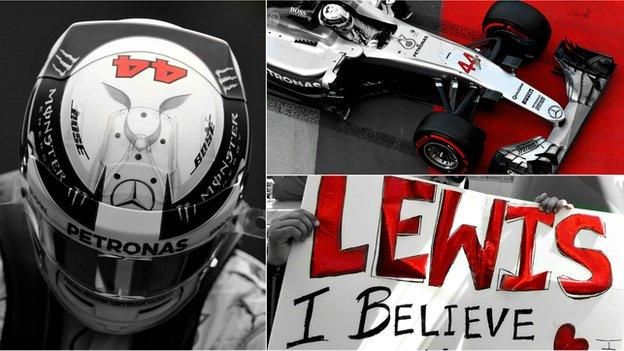
Will Lewis Hamilton come to rue his awful performance in qualifying for the Grand Prix of Europe?
The world champion described it as "probably the worst qualifying session I've ever had".
His error-strewn late afternoon driving on Saturday on the demanding new street track in Baku, Azerbaijan, left him 10th on the grid.
Because he was back there, his Mercedes engineers told him to use a specific engine mode for the race, which was supposed to give him more power but instead gave him less, because it had been configured wrongly.
That made his progress through the field slower than it would have been, so he burned up his tyres more quickly than he would have done and he could not do better than fifth place.
Hamilton's problems left his team-mate Nico Rosberg with as easy a cruise to the flag as is possible around a track that has traps waiting for a driver at literally almost every turn.
The cliche that no grand prix win is easy is just that because it is true. But Mercedes had a pace advantage so great in Baku that all Rosberg had to do was keep it out of the walls and victory was his. With it, as things turned out, came a 24-point lead in the championship.
What happened to Hamilton in qualifying?
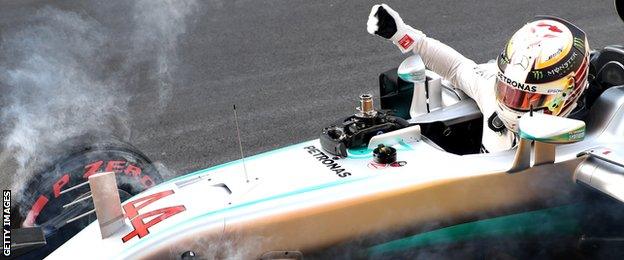
Hamilton said "he did not feel comfortable" in his car during Saturday's qualifying session
Why did Hamilton drive as badly as he did in qualifying? No-one knew. He had been blistering in Friday practice but come Saturday, while still the fastest thing out there, he was locking wheels everywhere.
"I couldn't push on the brakes," he said. "I just went straight on all the time."
The engine-mode problems that hit both Mercedes drivers in the race - Hamilton worse than Rosberg - were rooted in what boss Toto Wolff described as a "messy Friday".
On top of that, the track grip levels changed with the extra heat on Saturday. Mercedes made a set-up change and suddenly Hamilton felt less confident.
His individual sector times were so good, pole looked like a given. But he could not string a lap together. It looked as if, had he backed it off by 0.2secs or so, he still had enough to take pole. That would certainly have been the wiser approach in hindsight. But as Wolff put it: "That's not in his make-up."
The result was a series of lock-ups and errors and, eventually, a crash. It was an unusually - almost shockingly - poor performance from a man of such sublime talent. And from that moment on the race was Rosberg's to lose.
Neither Hamilton nor Mercedes had an explanation for his unruly driving. But one senior team figure said: "Maybe that's part of his genius. Sometimes you just have to accept the flip side of it is that he is going to have an off day."
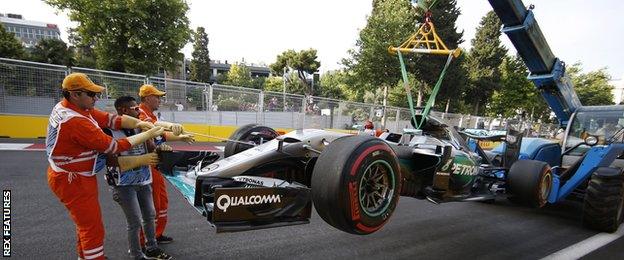
A dominant display in practice did not translate to a 54th career pole for Hamilton
Why did the race go wrong for Hamilton?
For the start of the race, Hamilton was told to put his engine in a specific setting that should have guaranteed him more power, to make it easier to pass the cars in front of him. Rosberg was not - because the Mercedes was so superior he did not need it.
But from lap four, Hamilton noticed that the engine was "de-rating" - not deploying its full electrical energy. It took the team a while to work out what it was. When they had - an engine mode had been configured incorrectly and was not behaving as expected - they could not tell him how to fix it because of the restrictions on the amount of help a driver can be given by a team over the radio.
Because Hamilton had not done anything to make it happen, because he had changed nothing on the car, he did not know where to start in looking for a fix.
As he put it: "In the engine switch there are six positions and in those there are about 20 positions so I had no idea what the problem was and how to rectify it. I tried a few different things but it didn't work so I just went back to where I was."
He still managed to get up to a de facto fifth, but he found the rapid Force India of Sergio Perez a step too far.
Hamilton was not completely clear in his explanations after the race, but eventually he did make the crucial change - but by then he was 14 seconds behind Perez and there were only 10 laps to go, so it was too late to do anything about it.
He turned the engine down and cruised to the flag, hoping to save it to help his cause later in the season.
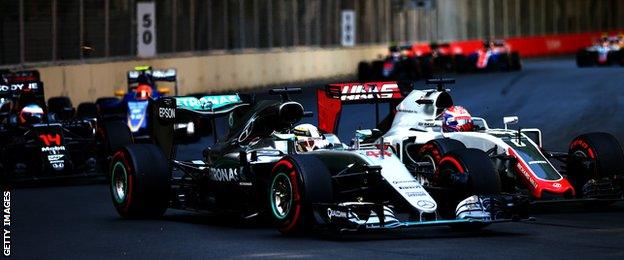
Hamilton still gained five places in the race, despite his technical disadvantage
How much did the problem cost Hamilton?
Hamilton said he thought the engine problem cost him about a second a lap.
Wolff said: "We don't know how much it is. As per the data, it is 0.2secs per lap but it must have felt like much more because the engines was de-rating between Turns Two and Three where you expect the biggest boost and that probably subconsciously affected him."
In theory, then, it sounds as if Hamilton still should have been able to get by Perez, but he didn't. Why? Perhaps his tyres were over-cooked.
Perhaps the need to fiddle with the engine settings - and maybe even the frustration of knowing how much he was losing to Rosberg - was distracting him. We may never know.
Didn't Rosberg have the same problem?
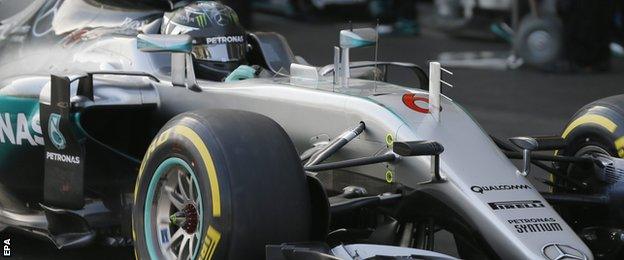
Without the team's radio help drivers have to come up with a solution to any problems themselves
Rosberg was also affected by the same mode issue in the race as Hamilton - but the subtleties of it meant the situation was very different for both drivers.
Not having been in the mode from the start of the race, Rosberg noticed the problem after he had switched to it. When the engine began to de-rate, he told the team.
They were only able to give him the same information that they had given Hamilton - that the "problem appears to be with the current mode that you are in" and that the setting was "incorrect".
The logical leap from that to changing out of the mode he had put the car into just before the problem occurred is obviously much smaller than one that had occurred four laps after the start of a race.
Hence Wolff's explanation: "We had a configuration setting problem - electronics setting with engine modes - which occurred on both cars.
"Because by regulation we're not allowed to tell the driver - they needed to figure it out.
"Nico was in the more fortunate situation that he did a switch change just before that kind of led him on the right path so within half a lap he went back into the right mode. Because Lewis didn't have that right path, it took him a while."
Rosberg increasingly impressive
This was Rosberg's fifth win of the season.
Yes, he has been helped by technical problems biting Hamilton - two consecutive identical hybrid system failures in qualifying in China and Russia, for example, that took him out of the battle for victory.
But the other three wins have come about because of errors Hamilton has made, however small.
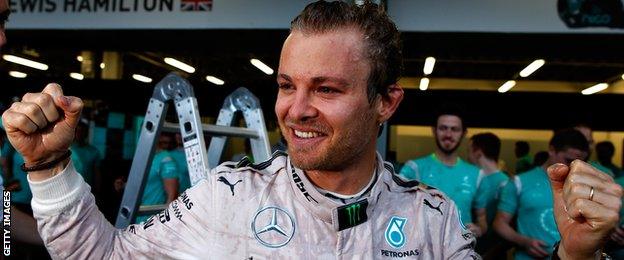
Despite back-to-back wins for Hamilton in the previous two races, Rosberg has increased his championship lead with the win in Baku
He made two relatively poor starts in Australia and Bahrain - the first within the scatter of a "normal" start but slower than his team-mate, the second when he delayed his reaction to the lights because the engine revs were not settling. Now he has made a complete hash of a weekend he should have dominated.
Rosberg is doing everything he has to do and the solidity of his resolve is admirable.
He has resolutely refused to get drawn into any kind of speculation about any kind of subject to do with the championship or Hamilton.
But he is doing it with a good humour that makes it impossible not to respect and warm to him.
He held, for example, a very amusing news conference after qualifying in which various journalists tried to get him to bite on various subjects, and he gently batted their questions away with wit, charm and a smile.
On Friday, early for the drivers' briefing, he popped into the media centre for a chat about the track with the English journalists.
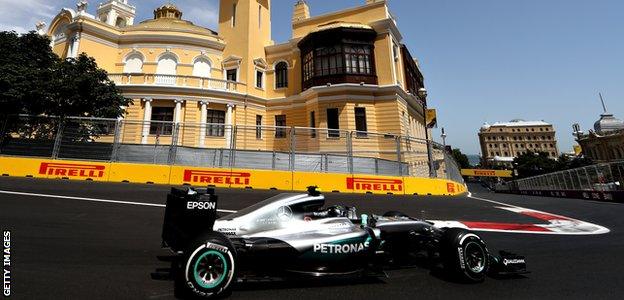
Rosberg led from the first corner in Azerbaijan and cruised to his fifth victory of the season
On track, too, Rosberg is doing the business. Hamilton continues to demonstrate the swashbuckling and sometimes awe-inspiring ability that has made him what he is - "one of the fastest drivers ever to drive an F1 car", as Jenson Button puts it.
Rosberg knows how good Hamilton is, knows that more often than not his team-mate will be quicker. So his approach is to concentrate only on himself, do what works for him, play the percentages and see what transpires.
"The best way for me to win races is to focus on the weekend," Rosberg said. "That's what I did here.
"I didn't feel bad because of losing so many points advantage to Lewis. If I do that I am not going to be able to win here in such a manner. I like to take it race by race and try to get the job done, focus and it worked out well."
So far, it is working well.
In a year in which engine-related grid penalties are almost a certainty because of the problems he has already had, does Hamilton have an answer?
If he does, he is not going to deliver it by driving as he did in Baku.